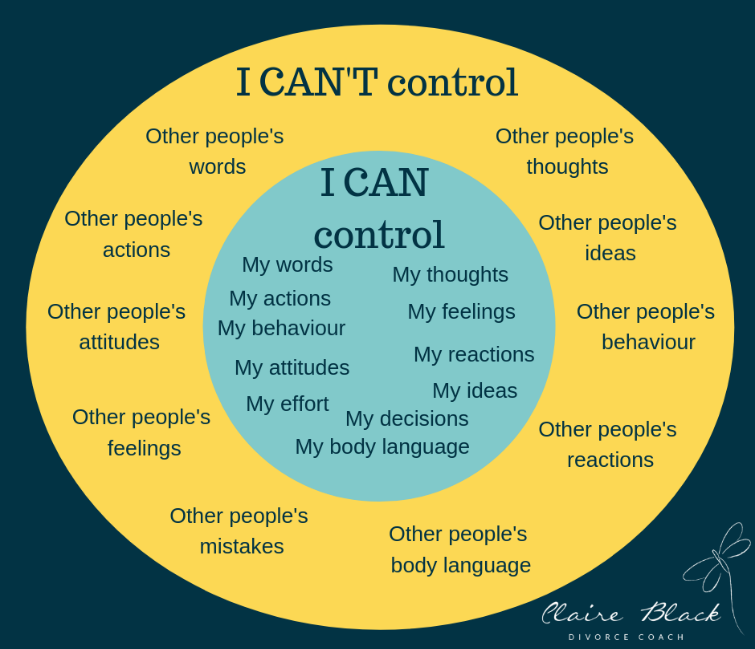How do you deal with frustration during divorce or separation
I’m sure, like me, you’ve been in a position of feeling frustrated during your divorce. Often, I see this happen when one person feels they just can’t seem to get through to their ex and make them understand their point. As a result, they feel frustrated, irritated, angry and powerless.
I have been working with a client recently, Jamie (whose name I’ve changed for confidentiality purposes), who was really struggling with this. He felt frustrated when his ex-wife refused to accept his point of view, and he found every conversation stressful. He spent a lot of time feeling frustrated and angry, and he used phrases like “I just wish I could get her to understand this”, and “Why can’t she just accept that?”.
Jamie and I did a lot of work around how to deal with frustration and anger, and especially, what he could and could not control. In our last session, we created a 5-point checklist for him of questions and strategies that he had learned to help him with the frustration he felt.
So here’s Jamie’s list of the best ways to deal with frustration during a divorce:
Stop. Breathe. Think. Act.
This became Jamie’s mantra. He could be hot-headed and sometimes respond with anger without pausing to breathe or think. ‘Stop. Breathe. Think. Act.’ became a go-to strategy for dealing with frustration or anger whenever anything happened that he couldn’t rationally cope with. Whenever he felt his emotions rising, he would stop to breathe before responding.
Am I in my zone of control?
Fundamentally, you can only control yourself, your reactions, responses, and behaviours. You cannot control how other people act.
Jamie realised that a lot of the time, he was trying to control others around him. He was frustrated when his ex-wife wasn’t responding how he expected her to or how he wanted her to. He wanted to make her understand his perspective, and act differently. Using my control diagram below, he saw that he was spending a lot of time in the yellow zone, outside his zone of control.

What was my part in this?
It can be very easy to blame the other person for all that feels challenging or difficult right now. This can leave you feeling like the powerless victim of circumstances over which you have no control.
Jamie and I came up with a list of great questions that helped him to think about what he could do to take responsibility for his part, and think of possible ways forward:
- What was my part in this?
- What do I usually do? Does it work? If not, what else could I try?
- What could I do differently?
Take a helicopter view
It’s easy to get caught up in your own view and interpretation of things when you’re experiencing strong feelings like hurt, pain and anger. It is easy to forget that the other person is probably also feeling strong emotions and may also be acting instinctively from a place of fear or hurt.
Jamie found the concept of taking a helicopter view really helpful. As we discussed recent arguments between him and his ex, I encouraged him to imagine that he was flying above the scene in a helicopter. From the helicopter, he could see himself and his ex, and he could see their different perspectives, backgrounds, and beliefs. He could see why each was responding in the way they did.
From the helicopter, he was able to describe his own position, how he saw the issue, and what he felt, heard, and believed. Then he was able to do the same for his ex-wife, and describe what she felt, heard, and believed. Sometimes he was able to find common ground, and he was always able to get a clearer view of why both were reacting as they were.
It enabled him to take a step back and see the scene as a third party might see it. He could see the bigger picture, and it helped him to step away from only seeing his own feelings.
Whose map am I in?
One of the fundamentals of NLP is that everybody has a different map of the world. We all have our own way of looking at the world, based on our beliefs, experiences and values, and even whether we are hot or cold, hungry, or thirsty, tired, or fully awake. Once Jamie understood this, he was able to see that he and his ex-wife had very different experiences of conflict.
Jamie’s ex came from a family who rarely argued and tended to sweep issues under the carpet or run away from conflict, while Jamie came from a family who would shout and cry and then make up. He realised that when he became angry, his ex-wife tended to retreat and become quiet and withdrawn. They were both following patterns set down in childhood.
Jamie started to be more curious about his ex-wife’s feelings and reactions and to think of different ways to communicate with her. It meant that he started to think about the sorts of words he chose to use and the ways in which he spoke to her. He made a conscious effort to use ‘Stop. Breathe. Think. Act.’ and be curious about how his ex was feeling.
By taking responsibility for his part in their conflict and looking at what he could do to change the dynamic between them, Jamie was able to concentrate on what was within his power to change. As a result, his levels of frustration dropped significantly, as did the levels of conflict with his ex-wife.
If you’d like to explore this topic further, listen to this episode of The Divorce Podcast where Kate Daly was joined by Ed Bassett, a well-being entrepreneur, Dad, and rugby fan to discuss his divorce and journey of self-growth.
If you would prefer some more direct help with navigating your divorce or separation, be it the legal, emotional or financial side, you can book a free 15-minute call with one of our Divorce Specialists below:
FAQs
How to get rid of frustration during or after your divorce or separation?
It's completely normal to feel frustrated during or after a divorce or separation. Allow yourself to recognise and accept these emotions without judgment. Surround yourself with understanding friends, family members, or even a therapist who can provide a supportive ear and offer guidance through this difficult time. Recognize that healing takes time, and it's okay to have good days and bad days. Be gentle with yourself and allow yourself to adapt to the changes as they come.
Are there any alternative ways to deal with frustration?
Mindfulness and meditation are great practices that can help you overcome that frustration and anger. Read our guide here about mindfulness on divorce.
Are frustration and anger the same thing when it comes to divorce?
While frustration and anger are related emotions and can often overlap, they aren’t the same thing, especially in the context of divorce. Frustration typically arises from feeling thwarted or blocked in achieving a goal or desire. Frustration during a divorce might stem from the legal process itself, disagreements with your ex-partner, or challenges in adjusting to the changes in your life. On the other hand, anger is an emotional response to feeling wronged, hurt, or threatened. On divorce or separation, anger might arise from feelings of betrayal, resentment, or unresolved conflicts with your ex-partner.
Read More

In this blog, we look at tips for keeping things amicable when you’re the initiator of the separation and want to discuss how to start your divorce and…
-3.webp)
In this blog, we explore forgiveness. What it is, the pros and cons of forgiveness and why you might choose to forgive your partner during a divorce or…

Divorce and separation are widely accepted as being one of the most emotionally traumatic things a person can go through. At amicable, we understand…

Start your amicable divorce journey
Speak to an amicable Divorce Specialist to understand your options and next steps for untying the knot, amicably.
Your guide to a kinder divorce
What if divorce didn’t have to be a battle?
In amicable divorce, Kate Daly offers compassionate, practical guidance to help you separate in a kinder, better way. Whether you’re just beginning, working through the practicalities or adjusting to co-parenting, this book meets you exactly where you are - and helps you move forward with confidence.
Pre-order on Amazon today






Comments (0)